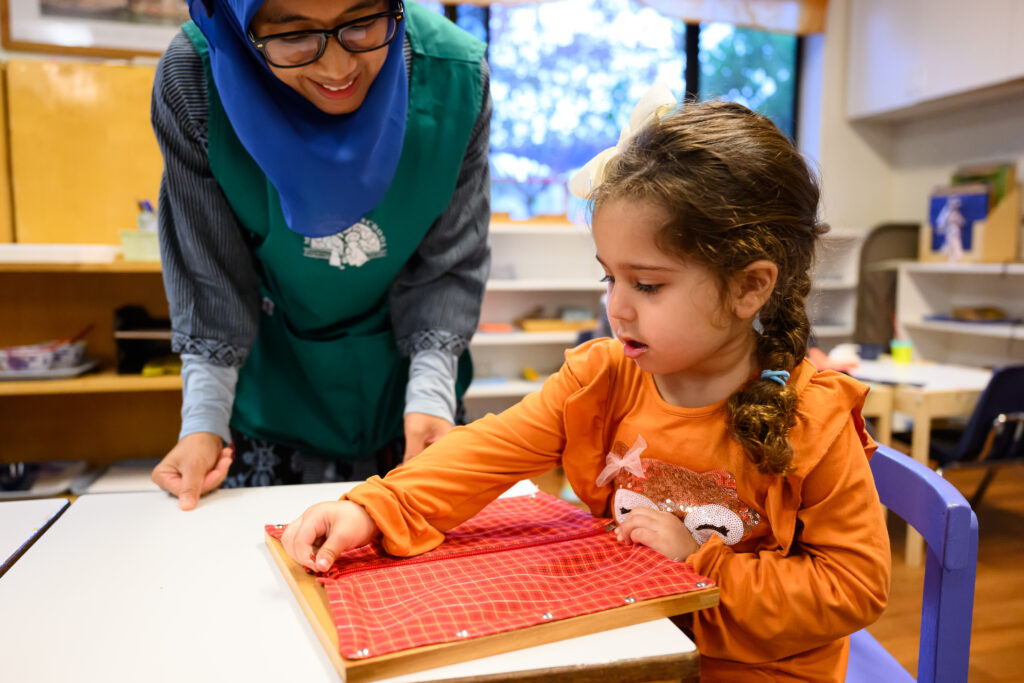The highest honor and the deepest gratitude you can pay me is to turn your attention from me in the direction of which I am pointing—the child.
Maria Montessori
To anyone not familiar with the guide’s role, it can appear almost hands-off. Though that lens can be frustrating or ironically humorous, that’s where the magic exists. Making it look easy signifies that you are doing the work. It takes trust, patience, presence, and care to facilitate a Montessori environment—trust not only in the child and the process but also yourself; patience to observe and not step in at the first sign of struggle; presence to attune to a room full of growing minds and changing interests; and care to welcome each child with a fresh start.
During Teacher Appreciation Week, AMS wants to extend the deepest gratitude and encouragement for our guides—past, present, and future. Gratitude isn’t just a feeling—it’s a practice woven into every interaction, every environment, and every act of trust. Let’s take a closer look at how gratitude lives and breathes in Montessori classrooms and how we honor the vital role of the guide.
Practicing Gratitude in the Montessori Environment
In a Montessori environment, gratitude isn’t simply taught; it’s lived. Yes, the method encourages using “please” and “thank you,” but true gratitude is much deeper. It unfolds through daily practices of respect, mindfulness, and community-building. Guides model gratitude in the way they speak to children, how they prepare the environment, and how they celebrate small moments of growth.
By observing without judgment and offering encouragement instead of rewards, Montessori guides help children cultivate an intrinsic appreciation for their work, their peers, and themselves. Gratitude is reflected in every part of the day—from the way a child carefully returns a material to its place, to the way classmates support one another’s discoveries.
Practicing gratitude means acknowledging the process over the outcome and recognizing the effort, persistence, and courage it takes for a child to grow into themselves. It means holding space for mistakes, for triumphs, and for everything in between. In this way, guides nurture communities rooted in empathy, respect, and joy, where gratitude is not an obligation but a natural expression of connection.
Honoring the Role of the Guide
If you feel comfortable, try this quick thought exercise. For a moment, close your eyes and imagine that you feel fully embodied and grounded in who you are. You feel confident that you can sustain your life through the ups and downs, safe to explore the world around you, and proud that you show up as nothing but yourself.
Hopefully, it feels warm and expansive.
Those feelings of ease, self-respect, and safety are the gift of the guide. You inspire those feelings. Guides, you are crucial in the process of exploring and learning about this world. You lead by example, offering a mirror into the Montessori philosophy in practice. You allow the child to learn naturally. Creating safe yet challenging environments, you offer children safe containers to get curious, try again, and grow. You celebrate every child’s unique qualities, lenses, and thought processes. You observe, attune, and step in only when necessary, allowing the child to build resilience, confidence, and independence.
Being a Montessori guide is no easy task, but it is joyful, impactful, and necessary.
To all the Montessori guides: thank you for your steady hands, open hearts, and unwavering belief in each child’s potential. Your impact reaches far beyond the classroom walls—you are helping to build a brighter, bolder future. During Teacher Appreciation Week—and every week—we honor you and the essential role you play. The American Montessori Society celebrates you, cheers for you, and is endlessly grateful for you!
Share this with a guide who made a difference—add a note of gratitude, too!


